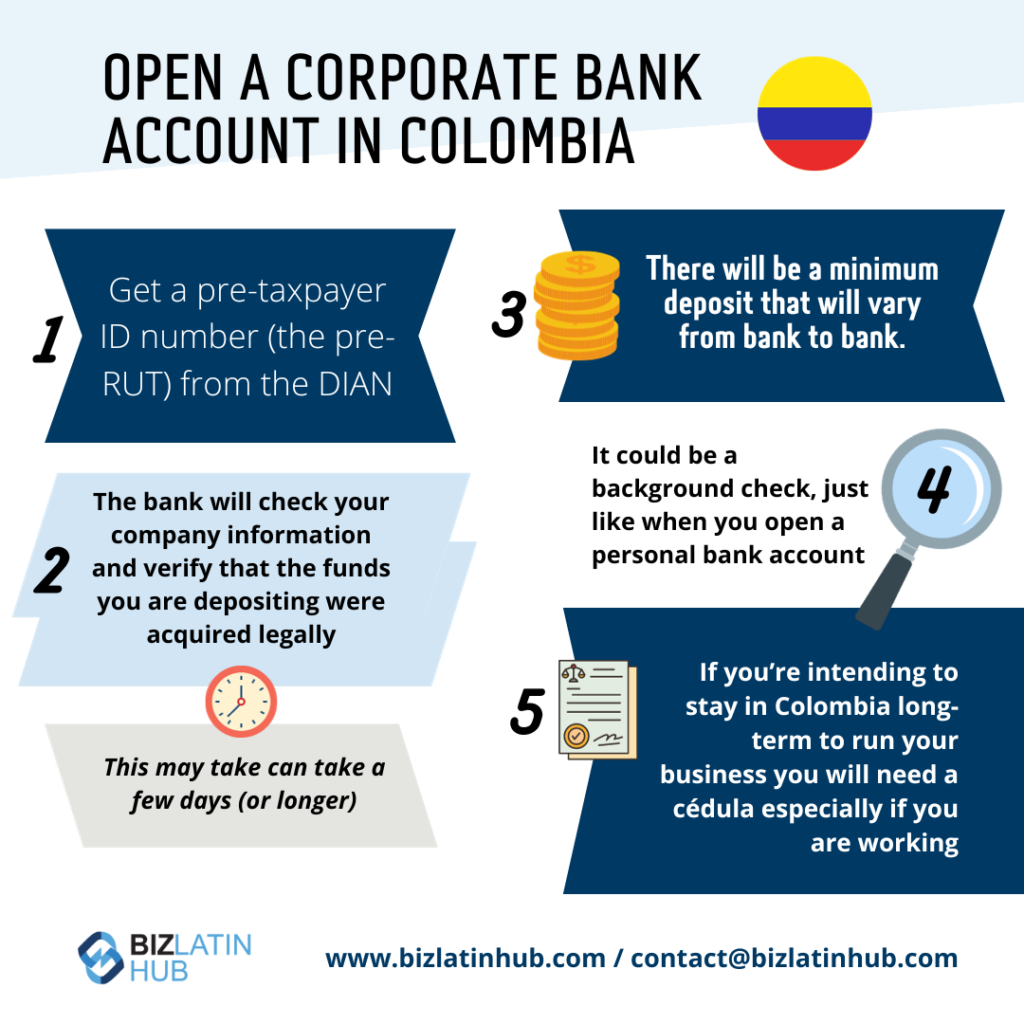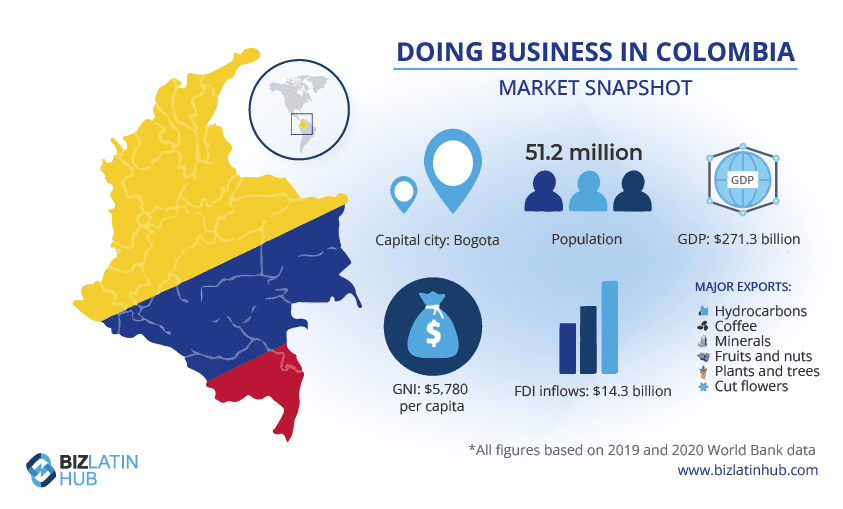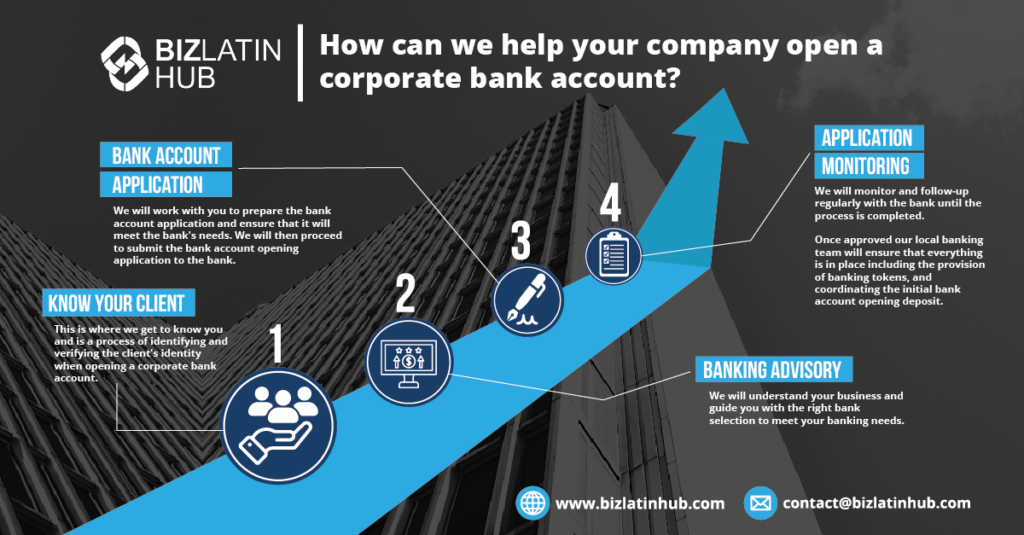
In Colombia just like any foreign country it can be frustrating trying to open a bank account. Corporate bank accounts can take a lot of time, which in many cases will end up costing you money. However it is an essential step in starting a business in Colombia.
In fact, without that bank account, you will not be issued a business license. It is therefore important to know when and where to start, Biz Latin Hub offers an analysis.
Table of Contents
To Open a Corporate Bank Account in Colombia you Need a Pre-Taxpayer Number (The Pre-RUT)
You will first need to get a pre-taxpayer ID number (the pre-RUT) from the DIAN, which you will use to open your new corporate bank account in Colombia (RUT stands for registro único tributario.) Setting up a checking account can take a few days (or longer), during which time the bank will check your company information and verify that the funds you are depositing were acquired legally. (Be sure you understand all the rules regarding wire transfers.
The process is heavily regulated in Colombia, and failing to take the proper steps could result in investigation and fines, as well as extra time, stress, and frustration.) It is also important to note that there will be a minimum deposit that will vary from bank to bank.
You can also expect a background check, just like when you open a personal bank account.
The bank will see that you have no outstanding warrants or unpaid bills. Certain criminal histories, such as those relating to drug trafficking, money laundering, and other financial crimes, could result in your account application being denied.
This could be serious enough to force you to choose another country in which to open your business. Hopefully this doesn’t apply, background checks can add time to the application process.

As with a personal bank account in Colombia, you will also need a Colombian identification card, the cédula, to open a corporate bank account.
There are some exceptions to this rule–for example, if you are employed by a Colombian company and are receiving regular payments, you can open the account with a foreign passport yet this involves complications.
However, if you’re intending to stay in Colombia long-term to run your business you will need a cédula especially if you are working. Biz Latin Hub has extensive experience in providing Visa’s Bank Accounts and Cedulas, we specialize in helping businesses set up while minimizing the amount of stress they go through.
We take care of the paperwork required to obtain a cédula as well as help set up your business.
After your corporate bank account is established, DIAN will issue the permanent tax ID for your corporation.
Common Questions when opening a corporate bank account in Colombia
Based on our extensive experience these are the common questions and doubts from our clients when looking to open a company bank account in Colombia.
No, you can not open a bank account online as all documentation must be signed with wet ink and delivered to the bank both digitally and physically. We always recommend appointing a legal representative based in Colombia as some of the actions before the bank must be performed in a physical Branch of the bank.
Normally, the bank will ask for the application form, the articles of incorporation, and the identification documents of the shareholders and legal representatives. If the bank sees it relevant, they will ask for additional documents.
Bank account access can be granted through the Virtual Platform of the Bank and with a physical security token device by the account owner. Some banks in Colombia will provide an online platform in both Spanish and English, but most are only in Spanish.
In most cases, we recommend using one of the larger banks which have significant experience with international commerce, provide a broad service offering, and have a large number of branches and ATMs. These banks are Banco de Bogotá, Bancolombia and BBVA.
A bank account is a must for all companies in Colombia. The bank account will allow you to operate, including paying taxes, payroll, local suppliers, and all domestic transactions.
Biz Latin Hub can help you open a corporate bank account in Colombia
At Biz Latin Hub, we provide integrated market entry and back-office services throughout Latin America and the Caribbean, with offices in Bogota and Cartagena, as well as over a dozen other major cities in the region. We also have trusted partners in many other markets.
Our unrivaled reach means we are ideally placed to support multi-jurisdiction market entries and cross border operations.
As well as knowledge of how to open a corporate bank account in Colombia, our portfolio of services includes hiring & PEO, accounting & taxation, company formation, bank account opening, and corporate legal services.
Contact us today to find out more about how we can assist you in finding top talent, or otherwise do business in Latin America and the Caribbean.Or read about our team and expert authors.

The information provided here within should not be construed as formal guidance or advice. Please consult a professional for your specific situation. Information provided is for informative purposes only and may not capture all pertinent laws, standards, and best practices. The regulatory landscape is continually evolving; information mentioned may be outdated and/or could undergo changes. The interpretations presented are not official. Some sections are based on the interpretations or views of relevant authorities, but we cannot ensure that these perspectives will be supported in all professional settings.